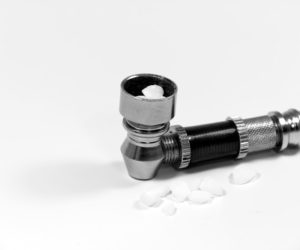Dangers of Crack Cocaine Use

Know the dangers of crack cocaine use and how detox and rehab from White Sands Treatment Center can help.
Cocaine is a potent stimulant drug derived from the coca plant that is native to South America. Classified as a Schedule II drug in the U.S., cocaine increases activity in the brain and central nervous system. Crack cocaine is a free-base form of cocaine that produces a quick and powerful high in the user. The effects of the drug will be felt immediately as it passes through the lungs, enters the bloodstream, and then enters the brain and body. Although delivery of the drug is quick, it has a short life of five to ten minutes. Often users will keep smoking crack to maintain the effects of the drug, and this abuse can cause tolerance to the drug which may lead to addiction. The dangers of crack cocaine use are many, and these dangers will affect the mental and physical health of anyone who uses crack.
There are many crack addiction symptoms that will get progressively worse as the addict continues his abuse of the drug. As the addict comes down from the high of the drug he may begin to feel irritable and depressed, and this will cause a craving for more of the drug. This consistent use of the drug will eventually decrease the desire for eating and sleeping, and the addict may become malnourished and develop a compromised immune system. Some of the crack addiction symptoms that the addict may experience include:
- Depression, paranoia, anxiety, psychosis
- Anger, hostility, bizarre or violent behavior
- An increase in blood pressure and body temperature
- A rapid heart beat, heart attack, stroke
- Seizures, convulsions, sudden death from overdose
When the addict uses crack cocaine he gets a quick, powerful boost of energy and feelings of euphoria. His focus will increase and he may experience muscle twitching and nosebleeds. He may also experience a complete change in his personality as volatile mood swings and aggressive behavior take hold. Crack addiction symptoms include having the addict continually seeking to get the drug and use it, regardless of the negative effects the drug use is causing. He may also begin to borrow or steal money to obtain the crack cocaine. Addicts often begin to neglect their duties and responsibilities and their attendance and performance at school or work begins to falter also. The addict may also become less logical and rational in his thinking, and he may engage in risky behavior.
The long-term effects of crack cocaine can be devastating to the body and mind of the addict. The addict may begin to engage in risky, unprotected sexual behavior and contract a sexually transmitted disease. Crack addicts usually become increasingly violent in their behavior and exhibit rage. They may become abusive to their children or spouse, and also harm them self. The addict’s top priority is to get crack cocaine and use it and he may engage in criminal activity to get the money for his drug. The addict may also stop paying his bills, withdraw from his family and friends and shirk his responsibilities.
The long-term effects of crack cocaine include:
- Lung damage and bleeding, shortness of breathe, respiratory damage
- Damage to the liver, kidneys and heart
- Severe depression and suicidal acts
- Delirium, psychosis, hallucinations, disorientation, panic
- Blood vessel damage to the ears and brain
- Stroke, seizures and heart attack
- Kidney and liver failure
- Cognitive impairment
- Central nervous system impairment
Crack cocaine addiction should be treated at an inpatient drug rehab facility where the addict can safely be weaned off of the crack. A crack addict should never attempt to get off of the drug without the help of medical professionals, as withdrawal symptoms can become severe. The dangers of crack cocaine use are serious. A medically supervised detox process will keep the addict stable and medications can assist in alleviating withdrawal symptoms. If you are in need of crack cocaine addiction recovery, you should contact a drug treatment center near you and begin treatment immediately.
If you or a loved one needs help with abuse and/or treatment, please call the WhiteSands Treatment at (877) 855-3470. Our addiction specialists can assess your recovery needs and help you get the addiction treatment that provides the best chance for your long-term recovery.
